GAME STUDIES | ONLY EXERCISES, FINAL PROJECT & REFLECTIONS
GAME STUDIES | ONLY EXERCISES, FINAL PROJECT & REFLECTIONS
1.4.2023 - 7.7.2022 (Week 1 - Week 7)
Er Xin Ru (Melanie) | 0354939
Bachelor Of Design (Hons) In Creative Media | Taylor's University
Subject: GCD61504 - Games Studies
INSTRUCTIONS
- Do you remember the first video game you played as a child?
- Go down that memory lane, and revisit the best memorable games you had played as you were growing up.
- Review the best parts of the games that makes you a fan, as well as the parts where you think the game could use some improvements.
- These childhood games and memories are most likely to inspire your potential game ideas.
- Present your findings as a video presentation and upload it into YouTube (set to Unlisted) for submission.
Game equation: Pick three references from variety of categories (childhood and traditional games, fictional settings, other video games, social media behaviours, hobbies) and build an equation and try to derive a game concept from that.
Playful experiences: What is the emotions that you want the players to experience? Express one strong emotion and create the possible connections to the game.
Link to everyday life: Another interesting scope you can consider, how your game can relate to the everyday life of your players? By including something familiar into the gameplay and setting, the more likely your players will find it intriguing.
- Task this week: Share the progression of your initial ideas with Miss Anis and continue developing from there
- Identify the suitable game principles and reflect this to the framework + playful experiences
- Make plans with your group members for next week Gameplay Exploration during self-directed class
Task:
Identify a non-digital game which has been converted into a digital version.
Discuss on:
Brief explanation of the gameplay
Differences and similarity of play dimension (real life vs on screen): Tip! Pick a game with either real-time or turn-based action; describe its core game mechanics and explain how the player experiences them temporally during both play dimensions.
Benefits and disadvantages of three-dimensional: Tip! Find a game that has appeared in both two-dimensional and three-dimensional versions; compare, and give grounds for whether three-dimensional is beneficial or not in games.
Present your findings as a video presentation and upload it into YouTube (set to Unlisted) for submission.
Identify a video game series or franchise that revolves around the same world (i.e: The Sims, God of War, Civilization, Guild Wars, Super Mario Bros) and discuss how each game’s iteration affects the world’s evolution.
-Brief description of the chosen game
-Differences and similarity of the world building throughout the series/franchise
TIP! Pick a game that revolves around the same world and lore. From here you can easily track the evolution of the worlds as the game progresses throughout the series/franchise.
Present your findings as a video presentation and upload it into YouTube (set to Unlisted) for submission.
- Upon collecting 3 cards and playing them, can be played as a Chance card or When played singularly, heals player for 1HP per card.
- Upon playing, it allows the player to privately view top 5 cards in the deck.
- Players blindly pick and steal 1 card from any other player’s hand
- When played, counters ONE death card OR negates damage from all accident cards in that turn.
- Upon playing, reverses player turn order. (clockwise/ anti-clockwise)
- Upon playing, it denies any effect of the action/ ability card played by another player. (Attack, Draw 3, See the future, Guess, Skip, Reverse)
- Upon drawing this card, the player has to deduct a certain number of HP based on the card drawn.
- When played, it forces the next player to draw 2 cards
- Allows players to hide a death card within their hand without losing 50% HP. If this card is stolen (via Guess card) player will be considered to have drawn a Death card.
- *If a Death card is stolen the other player is considered to have drawn a Death card
- Upon drawing this card, player -50% current HP(rounded down eg: 5->2) unless a Chance card is played or 3 Cupid cards are played.
- Upon playing, the player can choose to draw 3 cards or force the next player to draw 3 cards.
- Upon playing, the next player still draws at the start of their turn, but cannot play any cards.
- Maintain HP
- Decrease Opponent's' HP
The game's cards are designed to provide entertainment and add a lighthearted element to the gameplay.
Welcome to the instructional play video for the game "CUPID"! In this video, we will guide you through the rules and gameplay of this exciting card game. Let's get started!
[Introduction]
"CUPID" is a card-based game designed for 3 to 5 players. The objective of the game is to be the last player standing, strategically managing your health points (HP) and using various cards to attack and defend against opponents. Now, let's dive into the gameplay!
[Explanation of major card types]
Before starting our game, let’s take a closer look at the major card types that can affect your HP. There are four important cards you need to know:
- Death: When you draw this card, you deduct 50% of your current HP. If you end up with a decimal number, round down to the smaller whole number
- Accident: When you draw this card, you deduct a certain number of HP based on the card drawn.
- * What can you do when you draw both an Accident card and a Death card? Always deduct the points for the Accident card first, and then deduct the points for the Death card.
- Chance: When played, the Chance card counters one Death card or negates damage from all Accident cards in that turn.
- Cupid: When you collect and play three Cupid cards, you can use them as a Chance card. Alternatively, when played individually, each Cupid card heals you for 1 HP.
[Setup]
- Remove Accident, Chance, and Death cards from the deck.
- Each player receives 1 Chance card and 6 random cards from the deck. Depending amount of player
- Put the remaining cards back into the deck and reshuffle.
- All players start on tile 12.
- Choose one player to go first, and the game continues Anti-clockwise.
- Each player starts with 12 HP.
- During their turn, players must draw 1-3 cards and play at least 1 card.
- Throughout the game, players can use power cards such as Attack, Draw 3, See the Future, Guess, Conceal, Skip, Reverse, and Say No to protect themselves or attack other players.
- It's important to note that players cannot backtrack after passing over tile 4 and tile 8, even if they use Cupid cards to increase their HP.
- If the draw pile runs out, reshuffle the play pile and add it back to the draw pile.
- Finally, players are not allowed to have more than 10 cards in hand. If they exceed this limit, they must deduct their HP according to the number of excess cards and play those cards in the next round.
- Attack: When played, it forces the next player to draw 2 cards.
- Draw 3: Upon playing, the player can choose to draw 3 cards or force the next player to draw 3 cards.
- See the Future: Upon playing, it allows the player to privately view the top 5 cards in the deck. Players can choose to change the card order or take the card on the top.
- Guess: Players blindly steal 1 card from any other player’s hand. *If the player steals a Death card, they will be considered to have drawn a Death card and must deduct the points immediately.
- Conceal: Allows players to hide a death card within their hand without losing 50% HP. If this card is stolen (via Guess card), the player will be considered to have drawn a Death card.
- Skip: Upon playing, the next player still draws at the start of their turn but cannot play any cards.
- Reverse: Upon playing, it reverses the player turn order (clockwise/anticlockwise).
- Say No: Upon playing, it denies the effect of any power card played by another player (Attack, Draw 3, See the Future, Guess, Skip, Reverse).
That concludes our gameplay instruction video for "CUPID." We hope you now have a clear understanding of the rules and mechanics of the game. Enjoy the game, and may cupid's arrow be in your favor!
- The gameplay experience was not fun due to multiple bugs, including card ability issues, counting death cards, and accidental card triggers.
- Players easily died due to a lack of healing cards, resulting in fast game endings.
- The game lacked interaction as the process of adding and deducting HP became repetitive, turning it into an endurance match after introducing healing cards.
- Players struggled with understanding power cards, which required familiarity with card abilities before starting the game.
- The game ended faster and increased focus on the board
- The gameplay became more interactive during player attacks.
- The overall strategic depth was not as expected initially but became more interesting with rule refinements.
- The score indicate that while players were generally satisfied with the game, the sense of journey and adventure would benefit more higher satisfaction rating.
- The overall core experience was generally positive as the game mechanic and structure triggered players' attention. However, the game could benefit more motives immersion so to create the relevance of gameplay to the internalised expectation for playful experiences (i.e: perpetuate narratives, lore in the game or exercise more role play when playing).
- The overall score for social presence was very good. Our game enabled the players to have a sense of healthy motivation to compete and enforced their confidence when playing the game.
- While your players's playful experiences awareness were generally positive, our game could benefit from playstyle that challenges your players usual intellect and subjective emotions. (i.e: more dramatic cause and effect in the game rules, dynamic adventure options)
My semester was absolutely awesome! I had the chance to learn about game history, create my own game, and so much more. It was all new to me, and I loved every bit of it. Miss Anis were super knowledgeable and passionate about guiding us and also is a very friendly lecturer that I'm able to study in a laugh and fun environment, which made learning so much more fun. Miss Anis really knew how to bring the subject to life and get us excited about it.
But you know what made it even better? My teammates in the course. I'm genuinely thrilled to say that I had an amazing teammate for our assignment. We had a blast working together, and everyone really stepped up and gave their best as a team. I consider myself lucky to have such awesome teammates even we meet challenges but we help each other out. I learned so much from each member of the team, and the experience was incredibly rewarding. I'm absolutely in love with the game design we created for the cards and board, and the game mechanics we developed together. It's been a truly satisfying and enjoyable journey!
Overall, this course was a game-changer for me. I've grown so much, both personally and professionally. I feel proud of myself and grateful for the experience. It was fruitful, and I absolutely fell in love with the subject. It's been an incredible journey, and I couldn't be happier with how it turned out.



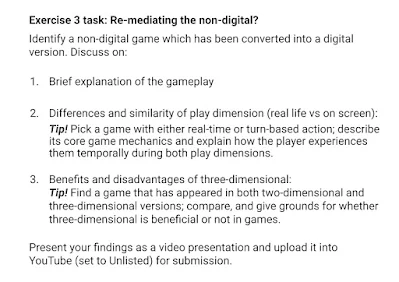


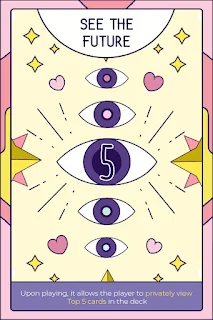



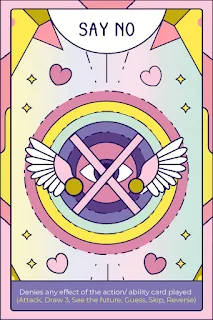

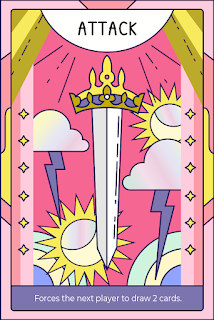





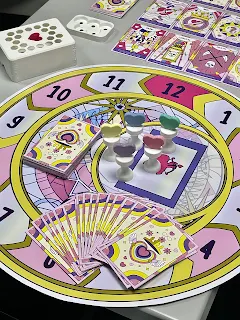



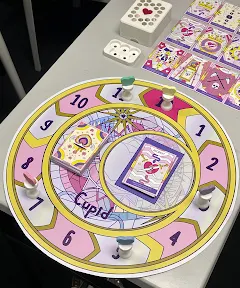


Comments
Post a Comment